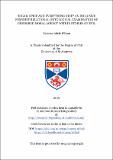Files in this item
Sugar, spice and everything nice? : an inclusive feminist relational ontological examination of gendered moral agency within stories of evil
Item metadata
| dc.contributor.advisor | Gentry, Caron E. | |
| dc.contributor.author | Wilson, Rebecca Adele | |
| dc.coverage.spatial | ii, 260 p. | en_US |
| dc.date.accessioned | 2019-11-06T09:44:33Z | |
| dc.date.available | 2019-11-06T09:44:33Z | |
| dc.date.issued | 2019-12-03 | |
| dc.identifier.uri | https://hdl.handle.net/10023/18858 | |
| dc.description.abstract | This thesis challenges the dominant narratives of evil, highlighting how the masculine approach to telling stories of evil has silenced moral agency. It does so through an inclusive feminist relational ontology framework, born from a study of care ethics. The thesis argues the need for an ontological relational feminist approach over a general feminist approach. Here, it engages with the work of Joan Tronto, Fiona Robinson, Margaret Urban Walker and Kimberly Hutchings to highlight the many merits of a feminist relational ontology. However, it also responds to the shortcomings of a feminist relational ontology approach, by engaging with critical (poststructural, queer, postcolonial and black) feminist literature to create an inclusive feminist relational ontology framework. Furthermore, this methodological framework is used to facilitate a discussion of evil in western thought, examining key points in the literature, and how this has led to the dominant narrative of evil within (Feminist) International Relations. It not only highlights the historical contextualization of evil and women, but how the study of evil, within moral theory, is itself gendered. Here, it is argued that the masculine approach to evil is rooted in abstraction and ambiguity, with the rational autonomous man as the primary agent. Therefore, through an inclusive feminist relational ontology framework, it shows how this masculine approach to narrating evil has silenced moral agency. Additionally, this thesis evidences how stories of evil silence moral agency, by scrutinising two case studies. The first explores a very different story of evil; rape culture in the west. Employment of an inclusive feminist relational ontology framework shows how cultural, patriarchal and racist norms have shaped societies, with a focus on the UK, leading to a single real rape narrative. Despite this, most attacks of sexual violence are incompatible with this narrative, meaning that the moral agency of both victims and perpetrators of rape is dissipated. The second case study explores the narratives around Ugandan rebel leader Alice Auma/Lakwena. It highlights, through the use of an inclusive feminist relational ontology framework, that postcolonial legacies and gendered norms have constructed moral boundaries around Alice’s complicated story. This hinders readers from seeing her as a moral agent in her decision making during her leadership of the Holy Spirit Movement and quest to banish evil from the world. Finally, a discussion of how this investigation questions our understanding of evil highlights power hierarchies within stories of evil and explores how many stories are externalized. Overall, this thesis calls for an opening of stories, even of evil, to allow for moral agency to be seen. | en_US |
| dc.description.sponsorship | "I would like to thank my funding providers: The AD Links Foundation Postgraduate Scholarship and The Sir Richard Stapley Educational Trust Grant, in addition, to the Department of International Relations for providing financial support for the attendance of conferences and proof reading." -- Funding | en |
| dc.language.iso | en | en_US |
| dc.publisher | University of St Andrews | |
| dc.subject | Care ethics | en_US |
| dc.subject | Feminist ontology | en_US |
| dc.subject | Feminist international relations | en_US |
| dc.subject | Evil | en_US |
| dc.subject | Moral agency | en_US |
| dc.subject | Gendering norms | en_US |
| dc.subject | Sexual violence | en_US |
| dc.subject | Narratives | en_US |
| dc.subject | Political violence | en_US |
| dc.subject.lcc | HQ1190.W56 | |
| dc.subject.lcsh | Feminist theory | en |
| dc.subject.lcsh | Feminism | en |
| dc.subject.lcsh | International relations | en |
| dc.subject.lcsh | Sex crimes | en |
| dc.subject.lcsh | Gender identity | en |
| dc.subject.lcsh | Political violence | |
| dc.title | Sugar, spice and everything nice? : an inclusive feminist relational ontological examination of gendered moral agency within stories of evil | en_US |
| dc.type | Thesis | en_US |
| dc.contributor.sponsor | AD Links Foundation Postgraduate Scholarship | en_US |
| dc.contributor.sponsor | Sir Richard Stapley Educational Trust | en_US |
| dc.contributor.sponsor | University of St Andrews. School of International Relations | en_US |
| dc.type.qualificationlevel | Doctoral | en_US |
| dc.type.qualificationname | PhD Doctor of Philosophy | en_US |
| dc.publisher.institution | The University of St Andrews | en_US |
| dc.identifier.doi | https://doi.org/10.17630/10023-18858 |
This item appears in the following Collection(s)
Items in the St Andrews Research Repository are protected by copyright, with all rights reserved, unless otherwise indicated.

